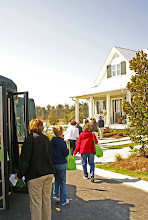Courtesy of the Island Packet of Hilton Head Island, S.C.
http://www.islandpacket.com/opinion/story/547271.html
Keep all options open for conserving energy
Communities should make it easier to install solar, other alternative energy systems.
Published Friday, July 11, 2008
Every set of covenants written has a mechanism for changing them. Communities whose rules preclude installing solar and wind energy devices should look at doing just that.
The ability to change covenants recognizes that circumstances change and rules that made sense 10, 20 or 30 years ago may not make sense today. With today's high energy prices and the critical need to reduce our reliance on oil, we should be looking at ways to encourage alternative energy sources, not discouraging them.
We urge homeowners associations where such attached structures are prohibited to start the process now to change the rules. At a minimum, associations should develop guidelines to look at such applications individually to ensure that architectural and aesthetic standards are met.
We don't have to sacrifice aesthetics for energy efficiencies, and we should encourage the latter.
Palmetto Electric Cooperative, after initially turning down the idea, is now on board with "net metering." The pilot program allows customers to sell excess electricity generated by solar or other alternative energy systems. Utilities like Palmetto Electric were required to look at offering the program under the federal Energy Policy Act of 2005.
The idea didn't generate much interest at first, but "we think it's the right message to send," said Jimmy Baker, the cooperative's vice president of marketing and public relations.
Baker said cooperative customers who are interested in net metering should make an appointment to discuss the program and their plans. Right now, the only home participating is the HGTV Green Home in Tradition Hilton Head in Hardeeville.
Baker cautioned that the cost of renewable energy systems and the amount of excess electricity they generate makes for a long payback. How quickly someone can recoup their costs for such a system depends on the energy source and how much electricity it generates.
But net metering will allow customers to recoup at least some costs through the sale of excess energy, and we applaud the cooperative's change of heart on net metering.
We must set aside outdated conventions when it comes to alternative energy and green building. Beaufort County officials tried to do that with a workshop on sustainable energy last month. Those attending brainstormed ways to conserve energy and tap alternative power sources.
Some ideas that emerged were:
• Expanding mass transit.
• Buying hybrids for use as county vehicles or use those that run on biodiesel.
• Using more video conferencing to reduce travel expenses for both county employees and agencies that work with the county.
• Giving tax breaks to residents with solar panels or small wind turbines that generate power.
• Exploringsuchtechnologies as turbines that generate power from the tides and biomass boilers to generate power.
A panel created by Gov. Mark Sanford last yearhas come up with50 recommendations on reducing greenhouse gas emissions. The Climate, Energy and Commerce Advisory Committee plans to issue its report later this month. The Charleston Post & Courier reports that among its recommendations are:
• Developing energy efficiency programs to help residential, commercial and industrial consumers reduce energy use.
• Drafting a renewable energy portfolio, which would include new nuclear energy proposals.
• Improving development patterns and upping efforts to reduce transportation pollution.
Rep. Ben Hagood told the Post & Courierthe recommendations would need to be instituted through legislation, regional planning, new policies, executive orders, tax incentives and credits, community interest and local government ordinances.
The report is to be posted on the Internet, and the public will be invited to comment. That feedback will be used for a final report that is expected this fall.
Addressing energy conservation clearly is a multipronged process. No one idea holds the answer, but the more options we have, the better our chances for success.
Subscribe to:
Post Comments (Atom)




No comments:
Post a Comment